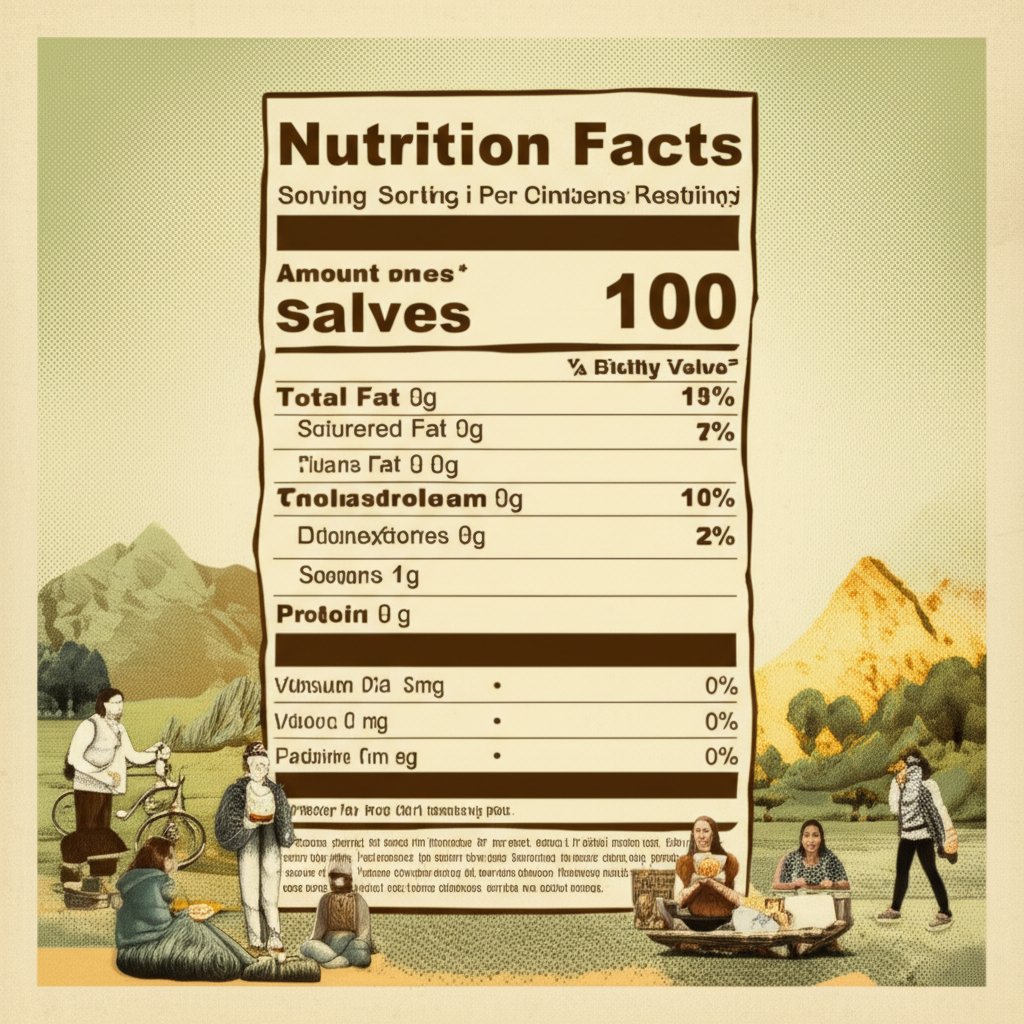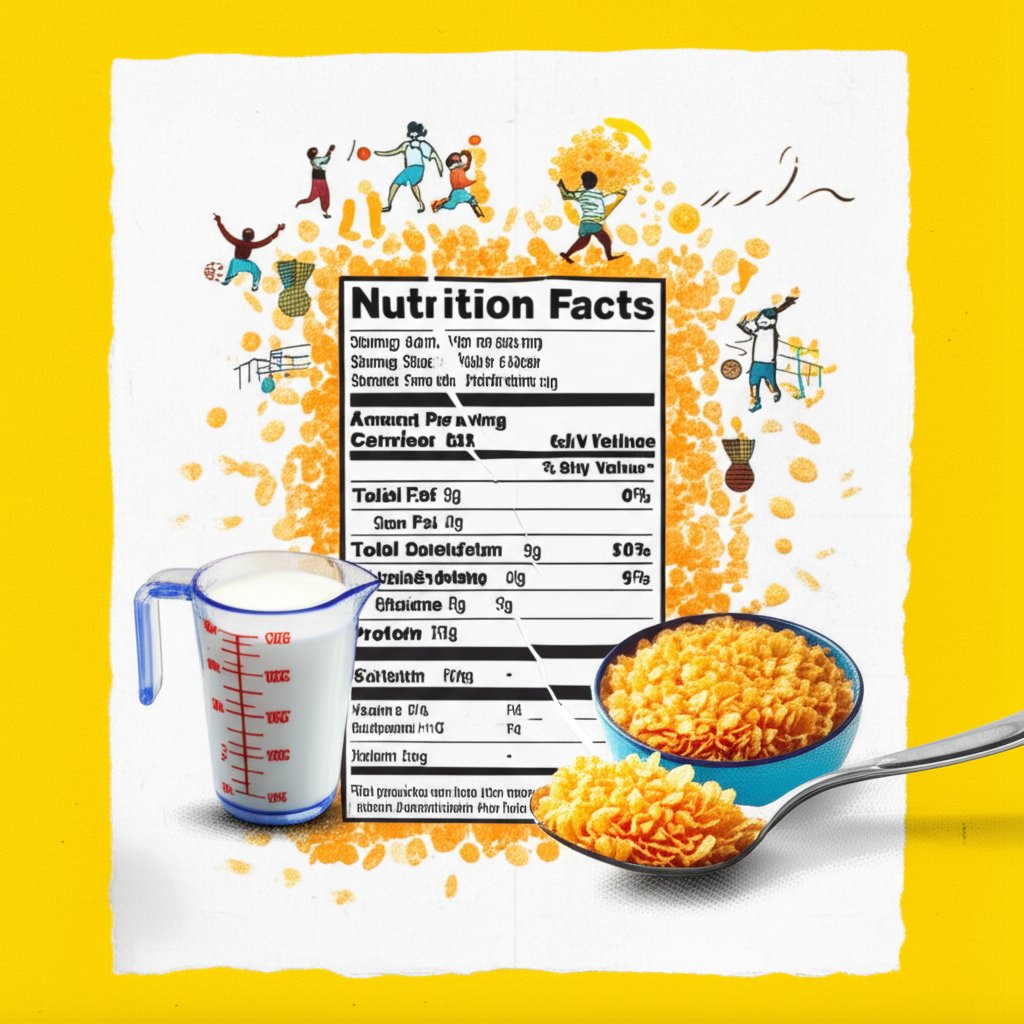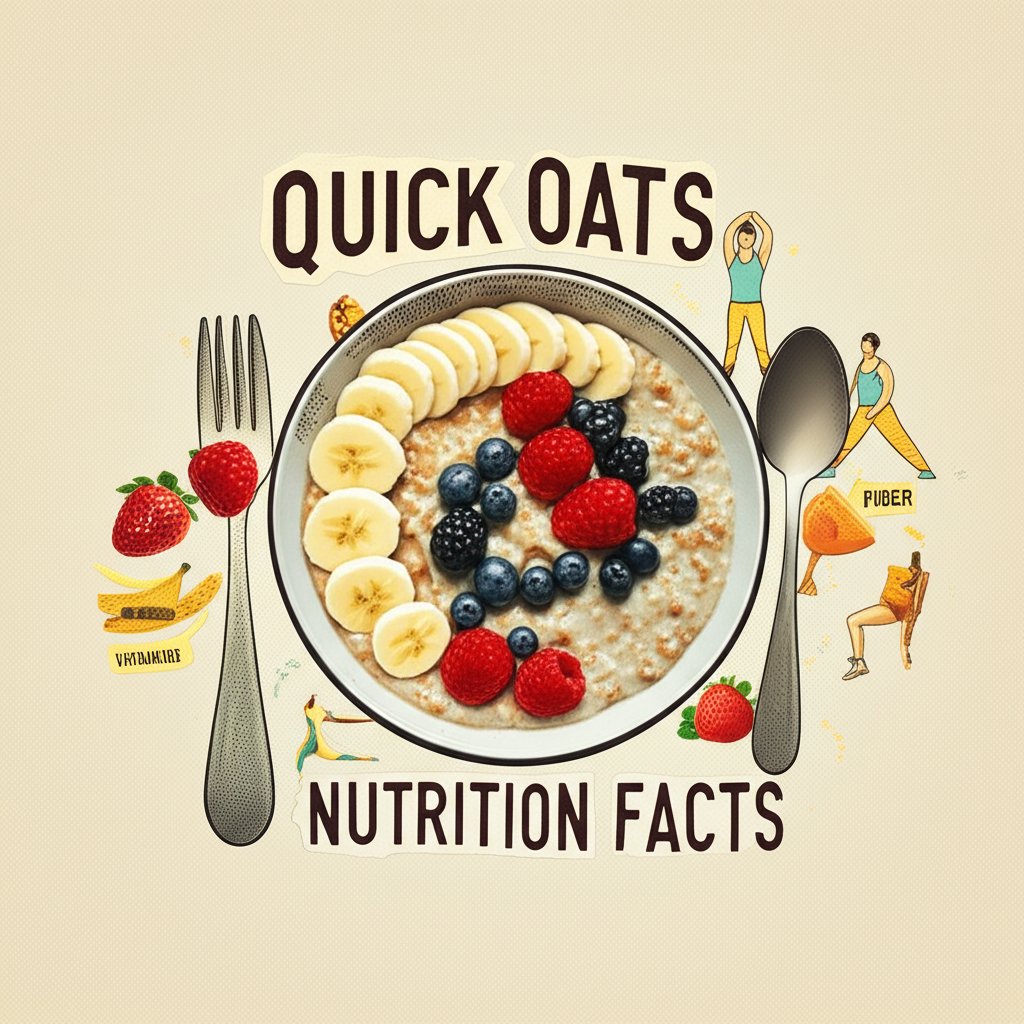Grabbing a bowl of quick oats is often seen as a healthy, convenient way to start the day. But are you truly getting the nutritional bang for your buck? Let’s dive into the quick oats nutrition facts so you can make an informed decision about incorporating them into your diet.
At a glance:
- Quick oats are a good source of fiber, which can aid in digestion and promote feelings of fullness.
- They offer a decent amount of protein, contributing to muscle building and repair.
- Quick oats are relatively low in sugar, making them a healthier option compared to some other breakfast cereals.
- They provide essential minerals like iron and calcium.
- While convenient, they are more processed than steel-cut or rolled oats, which may affect their glycemic index.
What Exactly Are Quick Oats?
Quick oats, also known as instant oats, are a type of oat groat that has been processed to cook faster. They are steamed and rolled thinner than rolled oats (also known as old-fashioned oats), which reduces cooking time significantly. This convenience makes them a popular choice for busy mornings.
Quick Oats Nutrition Facts: A Detailed Breakdown
Let’s take a closer look at the nutritional profile of quick oats. Keep in mind that nutrition information can vary slightly between brands. Here, we’ll use common values for a standard serving.
Serving Size: Packet, Cooked (177g)
- Calories: 120
- Total Fat: 2.4g (3% Daily Value)
- Saturated Fat: 0.4g (2% Daily Value)
- Trans Fat: 0g
- Polyunsaturated Fat: 0.8g
- Monounsaturated Fat: 0.7g
- Cholesterol: 0mg (0% Daily Value)
- Sodium: 87mg (4% Daily Value)
- Total Carbohydrates: 21g (8% Daily Value)
- Dietary Fiber: 3g (11% Daily Value)
- Sugars: 0.8g
- Protein: 4.2g
- Vitamin D: 0mcg (0% Daily Value)
- Calcium: 142mg (11% Daily Value)
- Iron: 11mg (61% Daily Value)
- Potassium: 108mg (2% Daily Value)
Let’s put that into perspective:
That 120 calories translates to about 32 minutes of walking at 3mph, or 12 minutes of running at 6mph, or 17 minutes of bicycling at 10mph.
Macronutrient Breakdown
- Carbohydrates: Primarily complex carbohydrates providing sustained energy.
- Protein: A decent source of plant-based protein, although not as high as some other protein sources.
- Fat: Low in fat, with a mix of healthy unsaturated fats.
Vitamins and Minerals
Quick oats offer a range of essential nutrients:
- Iron: Crucial for oxygen transport and energy production.
- Calcium: Important for bone health and muscle function.
- Potassium: Helps regulate blood pressure and fluid balance.
Fiber: The Unsung Hero
The fiber content in quick oats is a major benefit. Fiber helps:
- Regulate Digestion: Promotes healthy bowel movements and prevents constipation.
- Manage Blood Sugar: Slows down the absorption of sugar into the bloodstream, helping to stabilize blood sugar levels.
- Promote Satiety: Keeps you feeling full longer, which can aid in weight management.
Quick Oats vs. Other Types of Oats

While all types of oats come from the same grain, the processing methods differ, affecting their texture, cooking time, and, to a lesser extent, their nutritional profiles.
- Steel-Cut Oats: These are the least processed, taking the longest to cook. They have a chewier texture and a slightly lower glycemic index than quick oats.
- Rolled Oats (Old-Fashioned Oats): These are steamed and rolled into flakes. They cook faster than steel-cut oats but retain more of their texture than quick oats.
- Quick Oats: As discussed, these are the most processed, resulting in the shortest cooking time.
- Instant Oats: Often come in pre-packaged, single-serving packets and frequently contain added sugars, salt, and flavorings. It’s crucial to read the label carefully with these, as they can be significantly less healthy.
How Processing Affects the Glycemic Index
The glycemic index (GI) measures how quickly a food raises blood sugar levels. Because quick oats are more processed, they tend to have a slightly higher GI than steel-cut or rolled oats. This means they can cause a faster spike in blood sugar, which may not be ideal for everyone, especially those with diabetes or insulin resistance.
Health Benefits of Eating Quick Oats
Despite being more processed than other oat varieties, quick oats offer several health benefits:
Heart Health
Oats, including quick oats, contain a type of soluble fiber called beta-glucan. Beta-glucan has been shown to help lower LDL (“bad”) cholesterol levels, reducing the risk of heart disease. The soluble fiber content may be similar to that in Nutrition Facts: Rice Cakes, when comparing similar serving sizes.
Blood Sugar Control
The fiber in quick oats can help regulate blood sugar levels, making them a decent choice for people with diabetes. However, it’s important to be mindful of portion sizes and avoid added sugars.
Weight Management
The fiber in quick oats promotes feelings of fullness, which can help you consume fewer calories and manage your weight effectively. They make a far healthier breakfast than sugary cereals like Rice Krispies: Nutrition Information.
Digestive Health
Quick oats support healthy digestion due to their fiber content, preventing constipation and promoting a healthy gut microbiome.
Potential Drawbacks and Considerations

While quick oats are generally healthy, there are a few things to keep in mind:
Added Sugars and Sodium
Be mindful of added sugars and sodium, especially in flavored instant oat varieties. Always check the nutrition label and opt for plain quick oats whenever possible. You can then add your own healthy toppings like fruit, nuts, and seeds.
Processing
The more processing a food undergoes, the more nutrients it can lose. While the nutritional difference between quick oats and other types of oats is relatively small, opting for steel-cut or rolled oats more often can provide slightly more nutrients.
Phytic Acid
Oats contain phytic acid, which can bind to minerals and reduce their absorption. Soaking oats before cooking can help reduce phytic acid levels and improve mineral absorption.
How to Incorporate Quick Oats Into Your Diet
Quick oats are incredibly versatile and can be used in various ways:
- Breakfast: Prepare a bowl of oatmeal with water or milk and top with fruits, nuts, seeds, or a drizzle of honey.
- Smoothies: Add a scoop of quick oats to your smoothie for extra fiber and nutrients.
- Baking: Use quick oats in muffins, cookies, and other baked goods.
- Meatloaf/Veggie Burgers: Use quick oats as a binder in meatloaf or veggie burger recipes.
- Overnight Oats: Combine quick oats with milk (dairy or non-dairy), yogurt, and your favorite toppings in a jar and refrigerate overnight for a quick and easy breakfast.
Common Questions About Quick Oats
Here are some frequently asked questions about quick oats nutrition facts and their role in a healthy diet:
Are quick oats gluten-free?
Oats are naturally gluten-free, but they are often processed in facilities that also handle wheat, barley, and rye. If you have celiac disease or gluten sensitivity, look for certified gluten-free quick oats.
Can I eat quick oats every day?
Yes, eating quick oats every day can be part of a healthy diet, as long as you choose plain varieties without added sugars and sodium, and balance it with a variety of other nutrient-rich foods.
Are quick oats good for weight loss?
Quick oats can be a helpful tool for weight loss due to their high fiber content, which promotes satiety and helps regulate blood sugar levels.
Do quick oats raise blood sugar?
Quick oats have a slightly higher glycemic index than steel-cut or rolled oats, so they can raise blood sugar levels more quickly. Be mindful of portion sizes and avoid adding sugar.
Are quick oats as healthy as steel-cut oats?
While quick oats are still a healthy option, steel-cut oats are generally considered slightly healthier due to their lower glycemic index and greater degree of processing. Each form of oats has slightly different uses, and it’s helpful to understand which may best fit your desired use!
Making Quick Oats a Sustainable Habit
To truly enjoy the benefits of quick oats, focus on mindful preparation.
- Control portion size. It’s easy to overeat, especially if you add high-calorie toppings.
- Enhance flavor naturally. Instead of added sugars, try cinnamon, nutmeg, or vanilla extract.
- Mix in healthy fats and protein. A handful of nuts or seeds, or a scoop of protein powder, can help you feel fuller for longer.
Quick oats can be a nutritious and convenient addition to your diet. By understanding the quick oats nutrition facts, opting for plain varieties, and being mindful of portion sizes and toppings, you can enjoy the many health benefits they offer.
- Borosilicate Food Containers for Durable and Safe Everyday Use - January 30, 2026
- Borosilicate Glass Meal Prep Containers Offer Durable Oven-Safe Storage - January 29, 2026
- Glass Storage Bowls With Glass Lids Offer Superior Freshness - January 28, 2026










